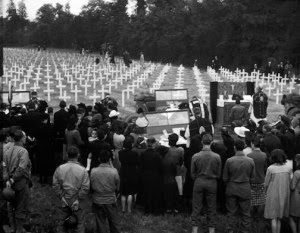A couple of years ago, my friend and classmate, Fr. Mark Knestout, and I were able to realize a long hoped-for trip to Normandy in France. We did some “holy” things – visited Mont Saint-Michel and Saint Thérèse in Lisieux – but mainly we did historical things, specifically visiting D-Day sites and museums.
It was great. I have a nearly
inexhaustible appetite for such touring. I did not know how high Fr. Knestout’s
threshold would be for obscure locations and marginal events, even though he and
I have travelled together a lot. It turned
out that he was at least as interested as I was! So we clattered about the Norman countryside
quite happily, prowling the hedgerows and coastlines in our rented diesel
Peugeot.
At the Utah Beach museum, one of the displays particularly moved
me. It showed the response of the local
populace to the sacrifice of the soldiers who fought and died around their
homes, and before their eyes, to liberate them.
One large picture showed an elderly couple, standing by the body of a
fallen GI. He had been covered with cut
flowers and branches, and they stood reverently beside him, obviously praying for
him.
Another photo showed the dedication of one of the several cemeteries for
the fallen liberators, set aside and filled in the first few days after the
landings. At the edge of a field of
identical wooden crosses, several Catholic chaplains were offering Requiem
Masses on makeshift altars, or on the hoods of Jeeps. Around them crowded servicemen and women,
along with obviously devout local folk, all praying for the repose of the souls
of those who had given their lives.
Grainy black-and-white photos can make the subjects they depict seem
remote from our own life and experience.
However, seeing these images of an action that touches me and touches
eternity, the Mass for the Dead, brought everything closer, and gave them
immediacy.
Even though not on the hood of a Jeep, we still offer the same eternal
sacrifice of Christ in the Holy Mass, and hold up to God the one redeeming work
that will offer redemption and life to those who have died. Especially when the dead have given their
lives in sacrifice and service, it is a right and just so to do.
Fr. Knestout and I offered Masses while in Normandy for the repose of
the souls of all the fallen. Not only
for our countrymen, either; we visited a German cemetery as well. We walked the rows of graves praying for them,
offering our rosaries in a way all of them would have recognized. Respect for service, and charity for souls, has
helped transform that long–ago enmity into friendship. This lesson seems to be lost on activists in
our own more partisan and even ideologically-puritan times.
I would eagerly recommend such a trip, whether to Normandy or to any
site of our nation’s great historical working-out of “liberty and justice for
all.” There are cemeteries very near to
us, both military and civilian, where lie the remains of many whose sacrifice
amplifies their importance to us.
But more accessible, and no less moving or important, is the journey
into prayer and sacrifice on behalf of all who have given their lives for our
nation and our safety. And the one
Sacrifice which will bring them to glory is only as far away as the nearest altar.
To call to mind these lives offered and given is to put the “memory” in
Memorial Day. To place our memory of
their sacrifice alongside Christ’s own sacrifice in the Mass, transforms our
visit to historical things into a holy thing.
Monsignor Smith





